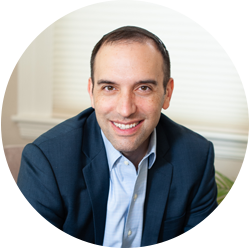Dear Friends,
Earlier this week, CJP and the Ruderman Synagogue Inclusion Project celebrated the beginning of Jewish Disabilities Awareness, Acceptance and Inclusion Month with “Together in Harmony,” an evening of learning and song. In his opening remarks and follow-up interview, Jacob Artson, a young adult from Los Angeles, discussed his experience living with autism and his perspective on disabilities, inclusion, and what it means to build communities where everyone feels they belong. Jacob’s words epitomized the Jewish saying, “Words that come from the heart enter the heart,” as he challenged us to do better, see better, and be better.
Earlier tonight, @rabbimarcbaker introduced @rabbicreditor, @therealneshama, Sharon Shapiro, Rabbi Bradley Artson, and Elana and Jacob Artson among others to kick off #JDAIM! Together, we celebrated the resiliency of the human spirt through reflection, song, & prayer. #JDAIM2021 pic.twitter.com/quNsgABi6D
— CJP — Combined Jewish Philanthropies (@CJPBoston) February 2, 2021
“Including people with disabilities in faith communities isn’t really about disability at all,” Jacob said. “In my experience, inclusion is really a mindset that each person has dignity and value no matter who they are. In order to include people with disabilities, we have to make our communities places that welcome people of all backgrounds, whatever their gender or race or ethnicity or age or religious background or place of origin, whether they may be single or in a relationship… [whether their] political views are different from ours.”
Jacob linked the dignity of every individual to the Jewish idea that each person is created B’tzelem Elohim — in God’s Image.
“We are fond of saying that everyone is made in God’s Image, but I’m not sure we actually believe it, because it seems we don’t try hard enough to find the part of God hidden in each person,” Jacob said.
I know that I was not the only one who was profoundly moved by Jacob’s words. We are living at a time of such intense dissonance — polarization, vilification, demoralization. When you face so many challenges and encounter what feels like existential threats every time you read the news or scroll through social media, it can be incredibly hard to see the Divine Image around you — let alone in those who are different or feel threatening to you. Yet, to have faith in humanity is to keep believing that the Image is in there. To play our part in repairing the world is to strive to see that Image, precisely when it can be so hard to see. When we do that — when we truly see one another and hear one another’s unique voices — we can create a harmony that has the power to transform each of us, our communities, and our broader society.
This vision of “together in harmony” is how I imagine the Israelites surrounding Mount Sinai when the voice of God called out from the mountaintop — the story we read about in this week’s Torah portion.
Our tradition describes the Israelites at Mount Sinai, “like one person, with one heart,” radically united and ready to experience the wonder of revelation, to receive Torah, and to become a people with a purpose. At the same time, we learn that every person heard the voice of God in their own way, according to their own abilities. This is a unity without uniformity, a community that preserves and draws power from the dignity and uniqueness of every individual.
I imagine the Israelites in a circle around Mount Sinai, looking one another in the eyes, seeing and being seen — both by God and by one another.
That is the kind of community that Jacob Artson and Jewish Disabilities Awareness, Acceptance and Inclusion Month and organizations including the Ruderman Family Foundation, Gateways, and Yachad work toward and challenge us to build. It is humbling and inspiring to do this sacred work with all of you.
Shabbat Shalom,
Rabbi Marc Baker

About the Author
CJP President and CEO Rabbi Marc Baker is an educator, writer, and leadership mentor who is devoting his life to Jewish learning and building Jewish communities.
